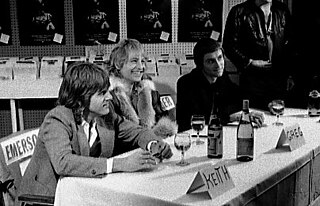
Emerson, Lake & Palmer (ELP) were an English progressive rock supergroup formed in London in April 1970. The band consisted of Keith Emerson (keyboards), Greg Lake and Carl Palmer. With nine RIAA-certified gold record albums in the US, and an estimated 48 million records sold worldwide, they were one of the most popular and commercially successful progressive rock bands in the 1970s, with a musical sound including adaptations of classical music with jazz and symphonic rock elements, dominated by Emerson's flamboyant use of the Hammond organ, Moog synthesizer, and piano.

Keith Noel Emerson was an English keyboardist, songwriter, and record producer. He played keyboards in a number of bands before finding his first commercial success with the Nice in the late 1960s. He became internationally famous for his work with the Nice, which included writing rock arrangements of classical music. After leaving the Nice in 1970, he was a founding member of Emerson, Lake & Palmer (ELP), one of the early progressive rock supergroups. Emerson, Lake & Palmer were commercially successful through much of the 1970s, becoming one of the best-known progressive rock groups of the era. Emerson wrote and arranged much of ELP's music on albums such as Tarkus (1971) and Brain Salad Surgery (1973), combining his own original compositions with classical or traditional pieces adapted into a rock format.

The Nice were an English progressive rock band active in the late 1960s. They blended rock, jazz and classical music and were keyboardist Keith Emerson's first commercially successful band.

The Best of Emerson, Lake & Palmer is an album by British progressive rock band Emerson, Lake & Palmer, released in 1994. This supersedes a 1980 compilation with a shorter, different track list and Japanese ukiyo-e cover.

Tarkus is the second studio album by English progressive rock band Emerson, Lake & Palmer, released in June 1971 on Island Records. Following their 1970 European tour, the group returned to Advision Studios in London, in January 1971, to prepare material for a follow-up. Side one has the seven-part "Tarkus", with a collection of shorter tracks on side two.

The Thoughts of Emerlist Davjack is the 1968 debut album by the English psychedelic rock and progressive rock group the Nice.

In the Wake of Poseidon is the second studio album by English progressive rock group King Crimson, released in May 1970 by Island Records in Europe, Atlantic Records in the United States, Philips Records in Australia, and Vertigo Records in New Zealand. The album was recorded during instability in the band, with several personnel changes, but features a very similar style and sequence to their first album, In the Court of the Crimson King. As with their first album, the mood of In the Wake of Poseidon often and quickly changes from serene to chaotic, reflecting the versatile musical aspects of progressive rock. To date the album is their highest-charting in the UK, reaching number 4. It has been well received by critics.

Gilbert Hotel is a 2003 solo album by Paul Gilbert formerly of the heavy metal band Racer X and the hard rock band Mr. Big. It was initially released as a bonus CD with his compilation album Paul the Young Dude/The Best of Paul Gilbert.

King of Clubs is the debut solo album by Paul Gilbert formerly of the heavy metal band Racer X and the hard rock band Mr. Big.

Emerson, Lake & Palmer is the debut studio album by English progressive rock band Emerson, Lake & Palmer. It was released in the United Kingdom by Island Records in November 1970, and in the United States by Cotillion Records in January 1971. After the group formed in the spring of 1970, they entered rehearsals and prepared material for an album which became a mix of original songs and rock arrangements of classical music. The album was recorded at Advision Studios in July 1970, when the band had yet to perform live. Lead vocalist and bassist/guitarist Greg Lake produced it.
"Tarkus" is the title track of Emerson, Lake & Palmer's second album. The progressive rock epic lasts 20:35. It was the longest studio song by the band until the three impressions of "Karn Evil 9". The name "Tarkus" refers to the armadillo-tank from the William Neal paintings on the album cover. The artist has explained that the name is an amalgamation between 'Tartarus' and 'carcass'. Consequently, the name refers to the "futility of war, a man made mess with symbols of mutated destruction." The song "Tarkus" supposedly follows the adventures of Tarkus from his birth, through a fight with a manticore, which he loses and concludes with an aquatic version of Tarkus named "Aquatarkus". Keith Emerson, when asked what work he is proudest of, named his "Piano Concerto" and "Tarkus".

Head is the soundtrack to the film Head, the only theatrical release by the Monkees. Released in 1968 through Colgems, it was the band's sixth album. Head was the last Monkees album to feature vocal contributions by Peter Tork until Pool It! in 1987 and the last to feature all four Monkees until 1996's Justus.
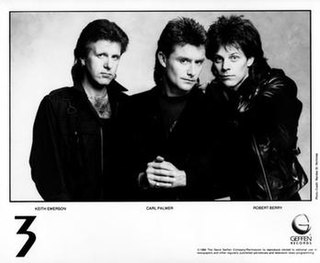
3 were a short-lived progressive rock band formed by former Emerson, Lake & Palmer members Keith Emerson and Carl Palmer and American multi-instrumentalist Robert Berry in 1988.
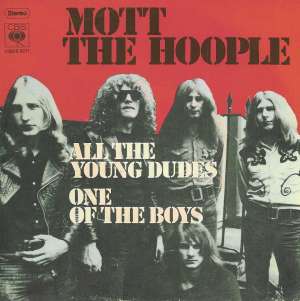
"All the Young Dudes" is a song written by English singer-songwriter David Bowie, originally recorded and released as a single by the English rock band Mott the Hoople in 1972 by Columbia Records. Bowie produced the song, which he had given to the band after they rejected his "Suffragette City". Bowie would subsequently record the song himself. Regarded as an anthem of glam rock, the song has received acclaim and was a commercial success. In 2021, Rolling Stone ranked "All the Young Dudes" number 166 in its list of the 500 Greatest Songs of All Time. It is also one of the Rock and Roll Hall of Fame's 500 Songs that Shaped Rock and Roll.

"The Loco-Motion" is a 1962 pop song written by American songwriters Gerry Goffin and Carole King. "The Loco-Motion" was originally written for Dee Dee Sharp, but Sharp turned the song down. The song is notable for appearing in the American Top 3 thrice, each time in a different decade: in 1962 by the American pop singer Little Eva ; in 1974 by the American band Grand Funk Railroad ; and in 1988 by the Australian singer Kylie Minogue.
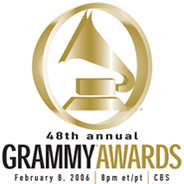
The 48th Annual Grammy Awards took place on February 8, 2006, at the Staples Center in Los Angeles, California honoring the best in music for the recording year beginning from October 1, 2004 through September 30, 2005. Irish rock band U2 were the main recipients with five awards including Album of the Year. Mariah Carey, John Legend, and Kanye West were each nominated for eight awards and won three; Alison Krauss & Union Station also won three awards; and Kelly Clarkson won two. Green Day were amongst the big winners, winning the Grammy Award for Record of the Year.
"Karn Evil 9" is an extended work by progressive rock group Emerson, Lake & Palmer, appearing on the album Brain Salad Surgery. A futuristic fusion of rock and classical themes, it was written by band members Keith Emerson and Greg Lake with former King Crimson lyricist Peter Sinfield. It is the fifth and final track on Brain Salad Surgery and, with a running length of 29 minutes and 37 seconds, is Emerson, Lake & Palmer's longest studio recording. The initial release of the album on vinyl split "Karn Evil 9" between the two sides due to its length, with a fade out/fade in between First Impression Parts 1 and 2. All subsequent releases on compact disc and digital download have "Karn Evil 9" as a single track, eliminating the fade.

Deep Tracks is a Sirius XM Radio channel featuring lesser-known classic rock music selections such as album tracks, one-hit wonders, concert recordings, "forgotten 45s" and "B-side" tracks.
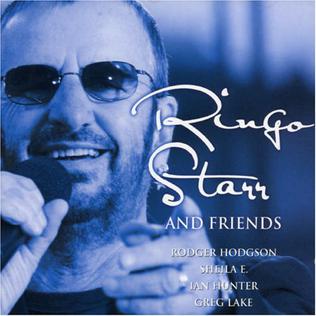
Ringo Starr and Friends is a 2006 live album by rock musician and ex-Beatle Ringo Starr, following his 2005–2006 tour. The album features the tracks from the All-Starr Band's 2001 tour. The album is a budget-release version of the King Biscuit Flower Hour Presents Ringo & His New All-Starr Band album released in 2002, containing the same tracks but omitting "The No No Song" and "Back Off Boogaloo." The album had limited pressing and was only released in Europe. Ringo's friends included on the album are Ian Hunter, Howard Jones, Roger Hodgson, Sheila E, Greg Lake and Mark Rivera.
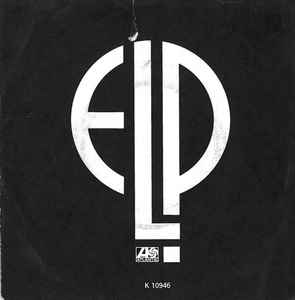
"Fanfare for the Common Man" is an instrumental piece of music adapted and played by the English progressive rock band Emerson, Lake & Palmer, from the group's 1977 Works Volume I album. Adapted by Keith Emerson from Aaron Copland's 1942 piece of the same name, it is one of their most popular and enduring pieces.

















